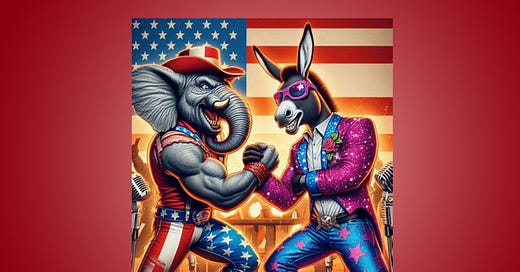Chancellor Buttigieg, Chancellor Vance, and the Politics of Union
The Great 21st Century Debate America Deserves
This is a guest post from Luke Nathan Phillips. He is a writer, tour guide, and MC in the Washington D.C. metro area.
In August, Vice-President and Democratic presidential nominee Kamala Harris bungled a major opportunity: instead of selecting Secretary of Transportation Pete Buttigieg as her token Midwestern white-guy Vice-Presidential nominee, she went with the vanilla, vaguely temperate, dad-vibed Tim Walz.
It was a historic robbery.
Those among us who dream up fantasy-football-style missed matchups and best-possible-tickets-in-history—Ford/Moynihan ’76, John McCain vs. Ted Kennedy 2000—take offense about these things. We live in a transition period between epochs, with the end of the age of celebrity politics of Barack Obama and Donald Trump and, perhaps, the return of comparative meritocratic-populist normality. Harris could’ve facilitated that future. Instead, we had a token of nostalgic-90s-style ‘civility’ in a vice-presidential debate more genuinely of the past than of the future.
Pete Buttigieg and J.D. Vance are something like the philosopher-kings of two ascendant Americas. Barack Obama and Donald Trump might have been their “tribunes,” as Michael Cuenco delightfully suggested in an appeal to American monarchism, but Buttigieg and Vance are their chancellors.
Michael Lind depicted the true divides in the coming America back in 2014. One is coastal cosmopolitan “liberaltarianism,” a general political economy, political culture, and social structure of the metropolitan cores, defined by density and integration to the international system, complex service economies, a class structure based on expanding numbers of intensively-credentialed professionals, and a suspicion directed largely against working-class populists and old-line bourgeois plutocrats. The other is heartland traditionalist “populiberalism,” defined by sprawling expansion and rootedness in continentally-based physical industries like manufacturing and agriculture, physically-intensive production economies, a class structure based on semi-professional classes connected to these industries, and a suspicion directed largely against low-skilled immigrants and coastal technocratic elites.
J.D. Vance, most blessed of the heartlanders, articulates softer-gentler-Trumpism better than any other politician and made himself famous for speaking effectively to Democrats. Pete Buttigieg, most cunning of the coast-dwellers, lived and breathed the style and understanding of elite meritocracy as much as any other McKinsey-class professional, and is often said to be more effective talking to Republicans than any other national Democrat. Aside from being expositors of the elites of both Americas, they are better positioned, from their current and coming posts in national power, to serve their parties by poaching the others’ frontline allies. If we’re going to play boring old 60/40 majoritarian-dream politics, as all the pollsters obsessing over some Philadelphia suburbs are blindered by, these two can speak to that. If we’re going to build a new party-factions politics, with an organized and respected bicoastal Republicanism inside the GOP and an organized and respected heartland Democracy among the Democrats balancing their centers of gravity, Vance and Buttigieg should be the natural first leaders to construct it.
Why nobody seems to have recognized this boggles the mind.
A few have noted pieces of what’s happening, of course. Aaron Renn helpfully wrote up one of the first parallel-lives takes a few months ago, emphasizing their youth—Vance is 40 and Buttigieg is 42—and noting their similar rises “on the elite professional-managerial fast track to the top via the standard series of resume building activities.”
Buttigieg: Harvard, Rhodes Scholarship, McKinsey, U.S. Navy in Afghanistan, Mayor of South Bend, Indiana (in the Midwest), Democratic whizkid, a memoir about how he grew up, failed Democratic Presidential nomination bid, U.S. Secretary of Transportation.
Vance: Ohio State and Yale, U.S. Marine Corps in Iraq, biglaw, venture capital, nonprofit founder, a memoir about how he grew up, U.S. Senator from Ohio (in the Midwest), successful Republican Vice-Presidential nomination.
These are men of the Professional-Managerial Class, and they both understand the actual paths to power in our technocratic-managerial-meritocratic order. But they both also have taken some old-fashioned optional side-quests, hobnobbing with the average American and imbibing the post-9/11 armed forces service ethos, which the average PMC never thinks to walk.
Renn posits that Vance will clearly be a national leader, and Buttigieg might be finished. His forecast is plausible—but little Nixons and even Kennedys know what comebacks take. The equally-neurotic, oppositely-tempered cultures of the brainy-MAGA elite and the Wokeish mainstream PMC (in this strange time when the Democrats are the respectable party and the Republicans are the counterculture, a fascinating dynamic) have forged these two politicians as much as they’ve forged their own paths. Buttigieg has taken risks and acted resourcefully, as has Vance. They’ve both got long runways.
Do these guys have souls? I don’t know, but if they don’t, we can’t judge them for it—their job is not to keep their souls. When they followed their ambitions into public service many years ago, they sacrificed honesty to responsibility in the name of the American people. What matters is what they represent. They represent a possible, even a likely, future of American conflict.
We fantasy football folks have long lamented the dearth of philosopher-kings upon the national stage. Here, now, is the chance: a twenty-years’ duel of the greatest champions of the age, what Kennedy-Nixon might have been for postwar America were it not for an assassin’s bullet and an overzealous White House aide. We have ourselves a great debate.
Neither side can win, of course. Not in the insane destroy-or-convert-or-suppress sense lurking beneath all American political rhetoric. We will always have to live with each other. If there’s a civility in smartness—and regrettably, my class continues to provide evidence against that prospect, again and again and again—then we ought at least to build an intellectual framework to inform the narrative framework to inform the popularizing the folks in-the-know up on high can operate within. (Perhaps they have; I am just a writer on the outskirts of that world.)
Here is a proposal:
The two Americas—Republican and Democrat, or Red and Blue, or Bicoastal and Heartland, or Elitist and Populist, or Traditionalist and Cosmopolitan, or whatever, and the multifarious social subcomponents which E-Pluribus-Unum into them, and the other Americas which hang along their sidelines, unrepresented and out of view—all these Americas need each other, as much as every feature of the American continent needs all the others. This is the politics of union, a strange and almost mystic logic that, in the infuriating Pragmatist American way, can never be explained, but somehow always works.
The two Americas, Red and Blue, are notoriously difficult to define—they’re constructs representing more complex realities, after all. But the real social phenomena we’re talking about are in contact and thus in conflict with each other, they recognize what is unique and valuable in themselves, and begin to define themselves and become more like themselves, by opposition to each other. In opposition to each other, they become, unknowingly, more like each other. Thus, they cannot exist without each other. This is conflict, of course, but they become at the very least interdependent, sometimes codependent, in their conflict; a split of their union would be a disaster not only for the whole, but for each of the parts.
For in that conflict, if conducted in the lowest and vilest ways, each force becomes the worst and pettiest version of itself, and curdles into something grotesque. We know this—the gridlock of the 2000s festered into the polarization of the 2010s, and devolves now into the distrust of the 2020s, and hopefully is redirected before it turns far worse.
But the flip-side of that decayed fate is redemption.
When this necessary dialectical conflict is fought on better terms, of mutual concession and unconditional goodwill, the highest virtues of either side redeem the deepest faults of the other; both sides change each other, subtly through contact rather than abjectly through conquest, and they become far better versions of themselves, while remaining themselves, and staying in the higher union. Old scars may never heal, but a stabler order, something more truly resembling nationhood, emerges.
This is the politics of union, and it is not the norm in American politics. The norm is gridlock and division, decay and rancor, unproductive and internecine and essentially stupid conflicts. Once we’ve languished in that rock bottom long enough, the only way up and out is the politics of union. It requires a certain kind of courage and a deeper kind of humility than most of us possess, and these are not things American political institutions have ever required of their servants. But it is possible nowadays as much as it was in the days and dreams of James Madison and Henry Clay and Abraham Lincoln; the American party system, that greatest incarnation of the logic of Federalist #10, has always forced it into existence, when operating at its best. (And we are not, presently, at our best.)
But Mayor Pete and J.D. Vance are among our best, and seem to intrinsically know that their own ambitions are hurt by the chauvinist appearance of the Republican Party and the elitist appearance of the Democratic Party, just as those appearances hurt the union. These champions’ great debate will not be on a stage in 2024. But should they be spared scandal and assassination by America’s special providence, they might live and fight and embody that great debate into the middle decades of the 21st century.
Both Americas, and America itself, would be better for that service.
What do you think of Vance and Buttigieg as chancellors of America’s political future? Join the conversation in the comments.




